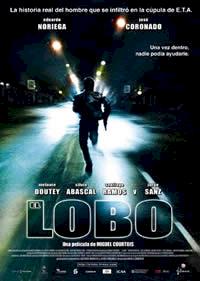
EL LOBO (THE WOLF)
Spain, 2004, 134 minutes, Colour.
Eduardo Noriega, Jose Coronado, Melanie Doutey, Silvia Abascal, Santiago Ramos, Patrick Bruel, Jorge Sanz.
Directed by Miguel Courtois.
Spanish cinema is still coming to terms with the Franco era, with dramas about the Civil War and its consequences and, more recently, films about the final years of FrancoâÃÂÃÂs regime. The recent Salvador is a story of young rebels, terrorist action in the early 1970s and Salvador Puig as the last person to be executed in 1974. The action in El Lobo takes place at the same time. However, the focus is on ETA and the Spanish governmentâÃÂÃÂs campaign against the ETA cells in the yearâÃÂÃÂs before FrancoâÃÂÃÂs death.
It is based on actual events.
The Lobo, the Wolf, of the title is a young construction worker from the Basque territories who had friends in ETA but was dismayed when they executed a taxi-driver acquaintance for alleged supplying of information to the Spanish authorities. When he is taken in by the police, the authorities offer him a chance to follow his principles and gain some finance for his straitened family by becoming an informer, then persuading him to infiltrate ETA at its highest level. This he did, keeping his cover through great personal difficulties, and handing over 150 members of ETA to the authorities. Of course, he is eventually discarded and abandoned by the authorities. A post-script tells us that thirty years later, he is still on an ETA hit list.
The film moves well and keeps audiences involved. And Eduardo Noriega is an impressive and engaging screen presence as The Wolf. In fact, the whole cast, both ETA and the Spanish police and secret service, are all convincing. While it is really an espionage drama, it has an almost documentary-like feel about it.
What we are to think and feel is quite ambiguous. It would be interesting to hear how Spanish audiences found it (it was nominated for a number of awards). It would be even more interesting to hear how patriotic Basques found it. The Wolf claims he is a man of principle against the violence perpetrated by ETA, but he is a double agent. The Spanish authorities are ultimately devious and brutal. The ETA terrorists are extremists and unscrupulously violent.
1.Spanish history? The 20th century? The Franco era? The end of the era? The fascist administration? The transition? The role of the Basques? Their revolution, ETA? Civil strife? A film portraying the 70s in Spain?
2.The narrative as a true story, credible, the records, the end and ETA still pursuing the Wolf?
3.The credits, the range of information about ETA? The newspaper headlines? Building up the case?
4.The Barcelona settings, Madrid, the border with France, the French scenes? Authentic locations of the period? The musical score?
5.The structure, the pursuit of the Wolf, his being caught in the house, the elderly couple, the phone call? His desperation, wanting to be rescued? The flashbacks, the explanation âÃÂàleading up to the re-presentation of the crisis? The end?
6.Txema, an ordinary young man, his wife and child, working in construction? Giving shelter to his friends? The street assassination and his driving? The police, the interrogations? The proposal, the explanations, his agreement to infiltrate ETA? His being used and manipulated? Willing?
7.The portrait of his wife, the relationship with his child, his wifeâÃÂÃÂs exasperation, leaving him? The phone calls throughout his activity? The sabotage of his business, the authorities manipulating him into accepting their proposal?
8.The picture of the Spanish police, the politicians and their control, vying with each other for authority and also for acclaim? Their use of spies? The information, gathering information, drop points? Control? The plans, the bombing of the bank? The arrests, the set-ups? Finally seeing the Wolf as expendable? Arguments between police and politicians? The torture of the policeman, his death âÃÂàregrettable and a mistake? Overenthusiastic? The end, the reporters and the politicians, their successes, medals?
9.Txema and his ability to infiltrate ETA, going to the wedding, seeing Amaia, her singing? Their discussions, the mutual attraction, her giving him the information? Explanations of the structure of the organisation? The discussions with Asier and meeting him? With the practical leader, Arrieta, with Nelson and his overall control from France? How well did the screenplay explain the structures and activities of ETA?
10.Txema and his greater involvement, the effect on himself, his character, maintaining his beliefs, part of the plans, issues of loyalty? Acts of terrorism? The sexual relationship with Amaia? Her believing him? Going to France? The burden of his double life? Meeting Nelson, giving the information to the police?
11.The bomb, his being warned, trying to get out, the deaths? The police and their action? A situation of war? Amaia and her suspicions of Nelson, explaining these to Txema? Her ambitions? Wanting to take over?
12.The character of Asier, his discussions, philosophy, the meetings?
13.Nelson, his leadership, character, regulating activities, the meetings with Wolf? His being wary? The final meeting and his arrest? The effect for the Wolf, having to dye his hair, disguise?
14.The final crisis, his being rescued, the government wanting to oust him, send him to Mexico? His decision to finish his work, supplying all the final information, the range of arrests?
15.With Amaia, his confessing, her shock, his explanation of his motivations?
16.His going to Mexico, his disappearance?
17.The aftermath, the death of Franco, the accession of the king, the amnesty for prisoners? Lobo disappearing and his being on the ETA hit list? A satisfying portrait of a political period, neither right nor wrong, good or bad, the complexities, seeing the activities as terrorism or war? Moral judgments?